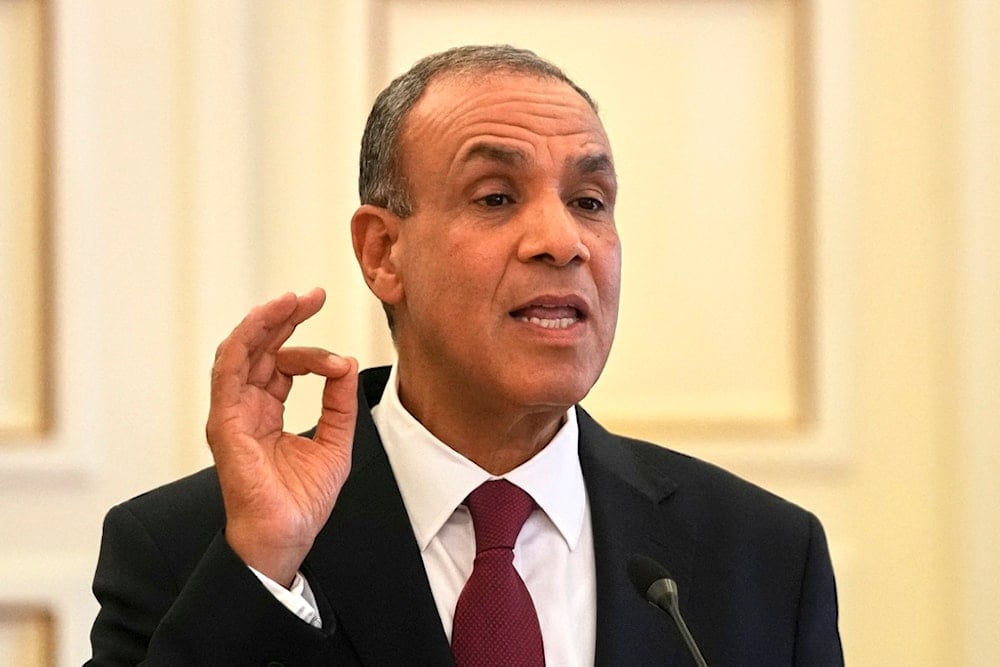Egypt slams Israeli settlement expansion, 'Greater Israel' talk
Egypt’s FM Badr Abdelatty rejects the Israeli occupation's war on Gaza, its West Bank settlement expansion, and the “Greater Israel” rhetoric in talks with the EU, UK, and France.
-

Egyptian Foreign Minister Badr Abdelatty speaks to reporters with his Greek counterpart George Gerapetritis after their meeting in Athens, Greece, Wednesday, August 6, 2025 (AP)
Egypt’s Minister of Foreign Affairs, Badr Abdelatty, discussed developments in Gaza and the expansion of illegal settlements in the occupied West Bank in separate calls on Friday with European leaders.
In a phone conversation with the EU High Representative for Foreign Affairs and Security Policy, Kaja Kallas, Abdelatty reaffirmed Egypt’s “categorical rejection of the expansion of the Israeli aggression on Gaza, the recent settlement expansion in the West Bank, and the latest statements calling for the embodiment of what is referred to as ‘Greater Israel.’” He warned that these actions fuel tensions, escalation, and instability in the region.
The Egyptian minister stressed the need to create a political horizon for a just and sustainable resolution to the Palestinian cause, ensuring the Palestinian people regain their legitimate rights, foremost among them the right to self-determination and the establishment of an independent state.
Calls with UK, France highlight rejection of settlement policies
In a separate call with UK Foreign Secretary David Lammy, Abdelatty emphasized the need for the international community to confront “irresponsible and unacceptable Israeli policies and statements that risk widening the circle of violence and escalation.” He underlined that these practices violate international law and global norms, at a time when regional and international partners are working to halt the “brutal Israeli aggression” on Gaza and ensure the unconditional entry of humanitarian aid.
Abdelatty also welcomed announcements from several Western states, including the UK, expressing intent to recognize the State of Palestine. He said expanding recognition of an independent Palestinian state on the June 4, 1967 borders with East al-Quds as its capital is the only path to lasting security and stability in the region.
During a separate call with French Foreign Minister Jean-Noël Barrot, Abdelatty reiterated Egypt’s categorical rejection of “Israeli attempts to entrench its illegal occupation of Palestinian land” and its recent settlement expansion in the West Bank, calling such moves a blatant violation of international law. He also condemned statements promoting the concept of “Greater Israel,” warning of the dangers of such rhetoric in fueling hatred, extremism, and instability.
The two ministers also discussed the Iranian nuclear file, efforts to de-escalate tensions, and the resumption of cooperation between Iran and the International Atomic Energy Agency, as well as negotiations between Tehran, Washington, and the E3 European states to reach a peaceful solution and avoid military escalation.
Egypt denounces starvation policy against Palestinians
In a call with EU Commissioner for the Mediterranean, Dubravka Suica, Abdelatty briefed her on developments in the Palestinian issue, reiterating Egypt’s firm rejection of “Israeli settlement policies and efforts to cement its illegal occupation of Palestinian land.”
He stressed that such policies flagrantly violate international law, fuel tension and extremism, and condemned “Israel’s policy of starving innocent civilians.”
A contentious plan
The plan includes over 3,400 settlement units connecting the illegal settlement of "Ma'ale Adumim" to occupied al-Quds, effectively severing the West Bank into two, and blocking any possibility of a contiguous Palestinian state.
E1, or "East 1," is a 12-square-kilometer area between occupied al-Quds and the Israeli settlement of Ma'ale Adumim. For years, international opposition kept the project frozen, due to its grave implications for Palestinian statehood and violations of international law. The International Court of Justice ruled in 2024 that all settlement activities in the West Bank and East al-Quds violate the Fourth Geneva Convention.
Smotrich did not conceal the motive behind the plan, declaring, "This will bury the idea of a Palestinian state," calling it the "final nail in the coffin" of any idea of a Palestinian State. He emphasized that the plan was developed in full coordination with Prime Minister Benjamin Netanyahu and with support from the US.
Smotrich's announcement to begin the construction of E1 settlements sparked outrage in occupied Palestine and beyond.
International law and the E1 plan
The E1 settlement project continues to draw international condemnation. The International Court of Justice has unequivocally stated that all settlements in occupied territories are illegal. The project is seen by legal experts, diplomats, and rights groups as a decisive blow to the "Two-state solution" and a tool for forced demographic change.
Despite this, "Israel" presses forward, emboldened by US backing and internal political consensus. As the situation escalates, Palestinian Resistance, both institutional and grassroots, remains steadfast in its opposition, framing the E1 project as an existential threat to the Palestinian national cause.
The European Commission voiced its opposition to the expansionist plan, declaring that the annexation of parts of the West Bank by "Israel" is illegal under international law. A spokesperson reiterated the EU's firm stance against the displacement and eviction of Palestinians, emphasizing that such measures jeopardize the prospects for peace and a viable "Two-State solution." The commission urged "Israel" to halt all settlement activity immediately.

 5 Min Read
5 Min Read









